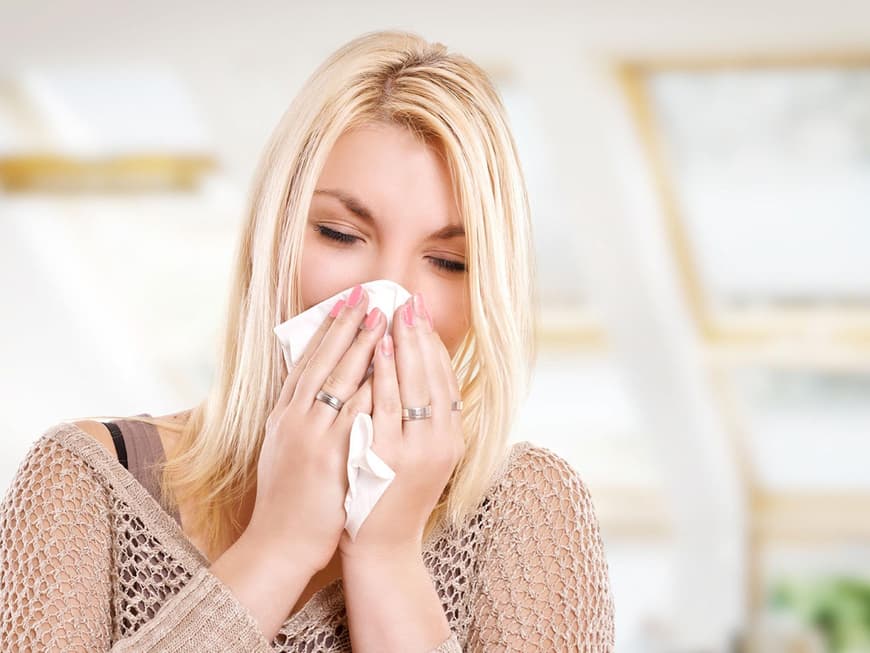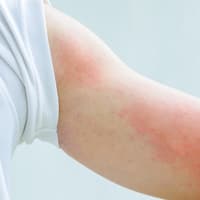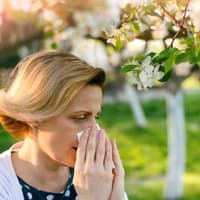
How do allergies develop?
"This is an overreaction of the immune system. It considers harmless substances to be a danger and fights them with all means at its disposal."
Can allergies be prevented?
"There are currently many scientific efforts to prevent allergies from developing. However, if it is already present, the best thing to do is not to expose yourself to allergens in the first place. But this is quite difficult in everyday life: with a pollen allergy, tiny microparticles fly around in the air. There is hardly any escape. With other allergens such as animal hair or house dust mites, contact should be strictly avoided."
Is an allergy hereditary?
"In principle, you can develop an allergy at any time. If both parents have an allergy, there is a high probability that the children will also develop one. Increased stress, excessive hygiene, an unbalanced diet or air pollution can also be responsible."
Can only medication help to treat allergies?
"Drug therapy as an allergy treatment is the basis for being able to live with an allergy at all. They don't cure the disease, but they do alleviate symptoms and prevent a change of stage - for example, hay fever turning into allergic asthma."
Is there a permanent cure?
"Immunotherapy is the only way to permanently alleviate or even get rid of an allergy. It works on a kind of vaccination schedule - the relevant allergen is administered to those affected in gradually increasing doses as tablets, injections or drops. In this way, the immune system becomes accustomed to the allergy-causing substance and reacts less and less sensitively over time, so that by the end of the treatment, typical allergic reactions may even be completely absent. However, desensitization takes up to three years - but it works."
The most common types of allergy
There are now more than 20,000 substances that are possible allergens. Allergists often have to do some detective work to determine the type of allergy.
Pollen
More than 16 million Germans are allergic to one or more of the 20 or so types of pollen in our country. From March to November, they are tormented by watery eyes, sniffles and sneezing fits. Almost one in three hay fever sufferers also has allergic asthma.
House dust mites
The arachnid lives in beds, carpets, curtains, cuddly toys ... Those affected react to the mites' droppings. Ventilate, mop and dispose of dust collectors frequently.
Nickel & latex
Itchy eczema is typical of contact allergies. Those affected complain of red spots on the skin when they come into contact with latex or nickel. You have to be careful with costume jewelry, wristwatches and fasteners, sometimes even with door handles.
Insect bites
The venom from bee and wasp stings can lead to life-threatening allergic reactions such as circulatory collapse, known as anaphylactic shock. Those affected should always have an emergency kit with them.
Animal hair
Red and itchy eyes, sneezing, runny nose - these are the symptoms. Cat hair is usually the trigger, dog hair is less common. What can help? Avoiding pets, because even the most thorough cleaning is not enough to remove the animal hair allergens.
Cross allergy
Pollen allergy sufferers are increasingly reacting to proteins in food that are similar to the proteins in pollen. For example, those who react to early bloomers such as birch, alder or hazel usually also have an intolerance to apples, plums, peaches, cherries, nuts and almonds - this affects more than one in two hay fever sufferers.
Mugwort pollen allergy sufferers react to herbs, spices, especially celery. Symptoms include redness, itching, swelling of the face, colic and even shortness of breath, sometimes leading to serious cardiovascular reactions.
Anyone who experiences these symptoms after eating fruit or nuts should see an allergist immediately. The good news is that even peeling or cooking the fruit can cause the allergens to disappear. The growing number of cross-allergy sufferers is also linked to globalized food trends. Many new allergens that previously did not exist in our country are suddenly part of our diet. Dragon fruit is a strong trigger, as is Victoria perch. Immune therapy can help here.

© fotolia






